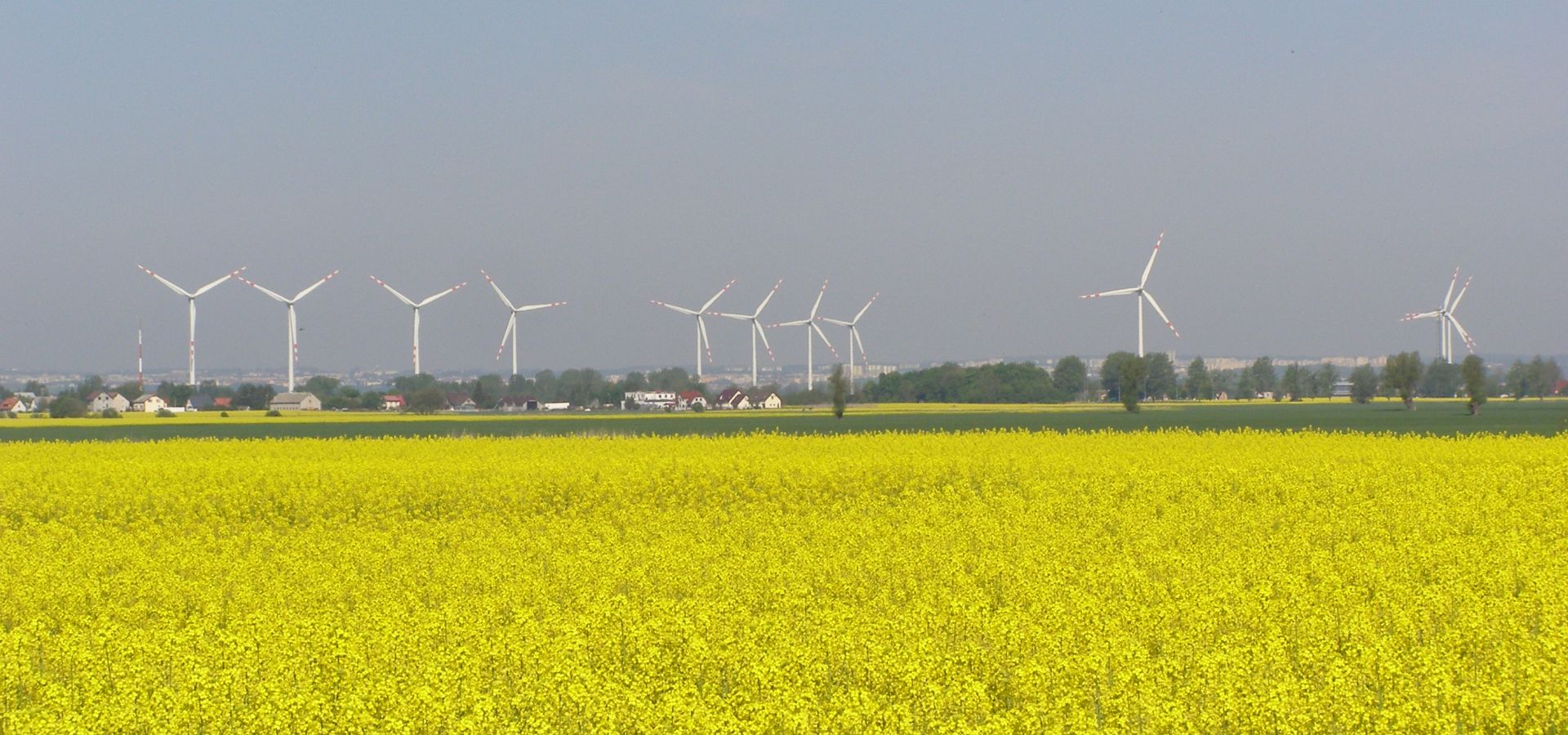Michał Olszewski has long written about the Polish conservative government trying (and failing) to bail out coal, and maintain energy independence. But these expensive and polluting practices could be coming to an end. Slowly but surely, the energy transition emerges in Poland.

Wind has the potential to give Poland energy independence – and cleaner air (Photo by Andrzej Otrębski, edited, CC BY-SA 3.0)
Is the conservative Law and Justice government changing its tone? The Polish party was brought into power by a wave of radical climate-skeptic rhetoric and declarations that Poland would remain a mining nation. But in recent months, there have been signs that its politicians intend to change the country’s energy portfolio.
Of course, we do not expect a declaration that the right wing’s 2015 campaign promises (‘We will not close mines’; ‘Poland must rely on black and brown coal’) were mistakes. After all, that would amount to an admission of ignorance or of pandering to public opinion. But this is beside the point. What matters is that, in the energy sector and among politicians, the idea is beginning to build steam that a Poland built on coal is a myth and ever-farther removed from reality.
First, Europe’s largest black coal producer, Polska Grupa Górnicza, announced that it was discontinuing retail sales of coal slurry and flotations, i.e. carbonaceous waste products. These will also not make their way to municipal companies, and current reserves will be burned, as ecologists have long been advocating. PGG was selling about 900,000 tonnes of carbonaceous waste products annually, making up 2.5 per cent of the company’s revenues.
This gesture is highly significant because it counts as an act in favor of smog reduction. Slurry and flotations are responsible for the high levels of air pollution in Polish cities, and withdrawing the cheapest coal types may reduce the current demand for coal (including for higher quality coal). Other coal companies intend to follow in PGG’s footsteps.
A regulation banning the sale of environmentally damaging coal furnaces, signed by Deputy Prime Minister Mateusz Morawiecki, is following a similar route. Their manufacture has been banned since October 1st, and in July 2018 a ban on the sale of such equipment will come into effect. Only accredited fifth-generation furnaces, which meet strict norms, will be allowed to operate. Importantly, the regulations relate to small, domestic devices.
This decision, as with the ban on selling coal waste products, may bring lasting change to the retail coal market and encourage people to seek alternative solutions. Of course, the situation may develop in various directions: the owners of old coal furnaces may give up that energy source entirely, or decide on new installations. Nevertheless, it is clear that reflection on the role of coal in the energy mix for the country as a whole – and for households – is becoming increasingly serious.
Information from bordering countries, and from the eastern borders in particular, plays an important role in how we think about the energy sector. The Law and Justice government has discovered that to build its touted energy independence on domestic energy sources is to build a colossus on legs of clay. This is not only because the Polish mining industry continues to struggle with considerable problems, despite attempts to restructure. The crisis in the mining industry and keeping coal as the main raw material for power stations and CHP plants has led to a situation that analysts have long been warning of: the ability to avoid energy supply deficits is becoming dependent on coal imports. Last year Poland received about 10 million tonnes of black coal, most of which was from Russia (with total coal consumption at 80 million tonnes). This means that our long-cherished energy independence is an illusion.
In a nutshell: EU climate policy will not change, and decarbonization of the economy will grow. Experts estimate that Poland’s economically viable black coal reserves will run out in about 20 years, and lignite in 30 years. A report of the Supreme Audit Office was also damning – it shows that in 2007–2015 the mining sector was subsidized to the tune of more than USD 18 billion. When similar calculations were presented by ecologists and economists for green think tanks, the politicians dismissed them. This time, however, the report was being presented by Poland’s highest inspection body. Its implications are all the darker in light of the successive teams which have tried to modernize the mining and energy sector with no success.
It is probably for all these reasons that the Polish energy minister, Krzysztof Tchórzewski, announced that only one more major coal-fired power station would be built in Poland, and no more. So, what instead? Perhaps a nuclear power station, or a gas-fired station, or perhaps wind farms. Not so long ago, this same minister was arguing that coal was a Polish treasure and that renewable energy sources were not cost-effective.
This turnaround is a clear signal – if the most die-hard advocate of the coal industry is furtively backing away from his own claims, it is a sign that we are genuinely unable to maintain the traditional energy model. It is just a shame that Polish politicians have decided to kick down a door which has long been unlocked.
Michał Olszewski (born 1977) – journalist, reporter, writer. For more than twelve years he worked for Gazeta Wyborcza and Tygodnik Powszechny, where he concentrated mostly on environmental issues. He is engaged in a Krakow-based campaign against air pollution.
[…] The Polish conservative government has been trying (and failing) to bail out coal, and maintain energy independence, writes journalist Michał Olszewski. But according to Olszewski, these expensive and polluting practices could be coming to an end. Slowly but surely, the energy transition emerges in Poland. Courtesy Energy Transition – the Global Energiewende. […]